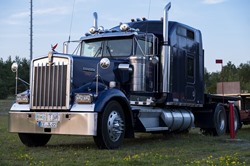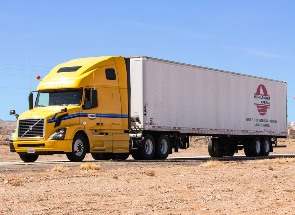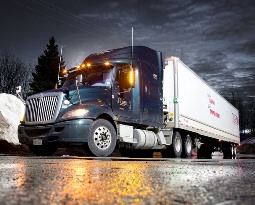How to Decide on the Right Truck Driving School near State Line Indiana
 Congrats on your decision to become a trucker and enroll in a truck driving school near State Line IN. Perhaps it has always been your fantasy to hit the open highway while operating a big ole tractor trailer. Or perhaps you have conducted some analysis and have found that a career as a truck driver offers excellent income and flexible job opportunities. Regardless of what your reason is, it’s essential to receive the appropriate training by selecting the right CDL school in your area. When evaluating your options, there are several variables that you’ll need to consider before making your final selection. Location will certainly be an issue, especially if you need to commute from your State Line residence. The cost will also be important, but selecting a school based only on price is not the ideal way to guarantee you’ll obtain the right education. Just remember, your goal is to learn the skills and knowledge that will allow you to pass the CDL examinations and become a qualified truck driver. So keeping that target in mind, just how do you choose a truck driving school? That is what we are going to discuss in the balance of this article. But first, we are going to discuss a little bit about which commercial driver’s license you will eventually need.
Congrats on your decision to become a trucker and enroll in a truck driving school near State Line IN. Perhaps it has always been your fantasy to hit the open highway while operating a big ole tractor trailer. Or perhaps you have conducted some analysis and have found that a career as a truck driver offers excellent income and flexible job opportunities. Regardless of what your reason is, it’s essential to receive the appropriate training by selecting the right CDL school in your area. When evaluating your options, there are several variables that you’ll need to consider before making your final selection. Location will certainly be an issue, especially if you need to commute from your State Line residence. The cost will also be important, but selecting a school based only on price is not the ideal way to guarantee you’ll obtain the right education. Just remember, your goal is to learn the skills and knowledge that will allow you to pass the CDL examinations and become a qualified truck driver. So keeping that target in mind, just how do you choose a truck driving school? That is what we are going to discuss in the balance of this article. But first, we are going to discuss a little bit about which commercial driver’s license you will eventually need.
Which Commercial Drivers License Should You Get?
 In order to operate commercial vehicles legally within the USA and State Line IN, a driver needs to attain a CDL (Commercial Driver’s License). The three license classes that one can qualify for are Class A, Class B and Class C. Since the topic of this article is how to choose a truck driver school, we will discuss Class A and Class B licenses. What distinguishes each class of CDL is the type of vehicle that the driver can operate as well as the GVWR (Gross Vehicle Weight Rating) or GCWR (Gross Combination Weight Rating). Below are short summaries for the 2 classes.
In order to operate commercial vehicles legally within the USA and State Line IN, a driver needs to attain a CDL (Commercial Driver’s License). The three license classes that one can qualify for are Class A, Class B and Class C. Since the topic of this article is how to choose a truck driver school, we will discuss Class A and Class B licenses. What distinguishes each class of CDL is the type of vehicle that the driver can operate as well as the GVWR (Gross Vehicle Weight Rating) or GCWR (Gross Combination Weight Rating). Below are short summaries for the 2 classes.
Class A CDL. A Class A CDL is needed to drive any vehicle that has a GCWR of more than 26,000 lbs., including a towed vehicle of more than 10,000 lbs. A few of the vehicles that operators may be able to drive with Class A licenses are:
- Interstate or Intrastate Tractor Trailers
- Trucks with Double or Triple Trailers
- Tanker Trucks
- Livestock Carriers
- Class B and Class C Vehicles
Class B CDL. A Class B CDL is required to drive single vehicles having a GVWR of more than 26,000 lbs., or a GCWR of greater than 26,000 lbs. including a towed vehicle weighing up to 10,000 lbs. A few of the vehicles that drivers may be qualified to operate with Class B licenses are:
- Tractor Trailers
- Dump Trucks
- Cement Mixers
- Large Buses
- Class C Vehicles
Both Class A and Class B CDLs might also require endorsements to drive certain types of vehicles, including passenger or school buses. And a Class A licensee, with the appropriate required endorsements, can operate any vehicle that a Class B licensee is qualified to operate.
Click Here to Get Free Information on Truck Driving Schools Near You!
How to Evaluate a Truck Driver School
 After you have decided which CDL you want to obtain, you can begin the undertaking of assessing the State Line IN truck driving schools that you are considering. As previously mentioned, location and cost will undoubtedly be your initial concerns. But it can’t be stressed enough that they should not be your sole considerations. Other factors, for example the experience of the instructors or the reputations of the schools are similarly if not more important. So below are several additional factors that you should research while performing your due diligence before choosing, and particularly paying for, your truck driver training.
After you have decided which CDL you want to obtain, you can begin the undertaking of assessing the State Line IN truck driving schools that you are considering. As previously mentioned, location and cost will undoubtedly be your initial concerns. But it can’t be stressed enough that they should not be your sole considerations. Other factors, for example the experience of the instructors or the reputations of the schools are similarly if not more important. So below are several additional factors that you should research while performing your due diligence before choosing, and particularly paying for, your truck driver training.
Are the Schools Certified or Accredited ? Not many truck driving schools in the State Line IN area are accredited due to the rigorous process and expense to the schools. On the other hand, certification is more commonplace and is offered by the Professional Truck Driver Institute (PTDI). A school is not obligated to become certified, but there are several advantages. Potential students recognize that the training will be of the highest quality, and that they will get an ample amount of driving time. For example, PTDI requires 44 hours of real driving time, not simulations or ride-alongs. So if a school’s program is certified (the program, not the school is certified), students know that the curriculum and training will comply with the very high benchmarks set by PTDI.
How Long in Business? One clue to help measure the quality of a truck driver school is how long it has been in operation. A poorly reviewed or a fly by night school typically will not be in business very long, so longevity is a plus. On the other hand, even the best of State Line IN schools had to begin from their opening day of training, so consider it as one of multiple qualifiers. You can also learn what the school’s track record is regarding successful licensing and job placement of its graduates. If a school won’t supply those stats, look elsewhere. The schools should additionally have relationships with local and national trucking companies. Having numerous contacts not only affirms a superior reputation within the trade, but also boosts their job placement program for students. It also wouldn’t hurt to check with the Indiana licensing department to confirm that the CDL trucking schools you are researching are in compliance.
How Good is the Training? At a minimum, the schools must be licensed in Indiana and employ teachers that are trained and experienced. We will discuss more about the instructors in the following section. Also, the student to instructor proportion should be no higher than 4 to 1. If it’s any higher, then students will not be receiving the personalized attention they will need. This is especially true concerning the one-on-one instruction for behind the wheel training. And look out for any school that insists it can train you to drive trucks in a comparatively short time frame. Learning to be an operator and to drive a tractor trailer skillfully takes time. The majority of State Line IN schools offer training courses that range from 3 weeks to as long as 2 months, based on the class of license or type of vehicle.
How Experienced are the Trainers? As earlier mentioned, it’s imperative that the instructors are trained to teach driving methods and experienced as both drivers and instructors. Even though several states have minimum driving time criteria to qualify as an instructor, the more professional driving experience an instructor has the better. It’s also crucial that the instructors stay up to date with industry advancements or any new laws or changes in regulations. Evaluating teachers might be a little more intuitive than other criteria, and perhaps the best method is to check out the school and speak with the teachers face to face. You can also talk to a few of the students completing the training and find out if they are satisfied with the quality of instruction and the teacher’s qualification to train them.
Enough Driving Time? Above all else, a great trucking school will provide sufficient driving time to its students. Besides, isn’t that what it’s all about? Driving time is the real time spent behind the wheel operating a truck. While the use of ride-a-longs with other students and simulators are necessary training methods, they are no substitute for actual driving. The more instruction that a student receives behind the wheel, the better driver she or he will become. And even though driving time differs among schools, a reasonable benchmark is a minimum of 32 hours. If the school is PTDI certified, it will furnish no less than 44 hours of driving time. Check with the State Line IN schools you are looking at and ask how much driving time they furnish.
Are they Independent or Captive ? It’s possible to get free or discounted training from a number of truck driver schools if you make a commitment to be a driver for a specific carrier for a defined time period. This is what’s known as contract training, and the schools that provide it are called captives. So instead of maintaining associations with a wide range of trucking lines that they can place their graduates with, captives only refer to one company. The tradeoff is receiving free or less expensive training by giving up the freedom to initially work wherever you choose. Clearly contract training has the potential to limit your income opportunities when beginning your new career. But for many it may be the best way to get affordable training. Just be sure to inquire if the State Line IN schools you are looking at are independent or captive so that you can make an informed decision.
Offer CDL Testing Onsite? There are several states that will allow third party CDL testing onsite of truck driver schools for its students. If onsite testing is permitted in Indiana, ask if the schools you are considering are DMV certified to provide it. One advantage is that it is more convenient than contending with graduates from competing schools for test times at Indiana testing centers. It is also an indication that the DMV deems the approved schools to be of a superior quality.
Are the Classes Flexible? As earlier mentioned, CDL training is just 1 to 2 months long. With such a short term, it’s imperative that the State Line IN school you select provides flexibility for both the curriculum and the scheduling of classes. As an example, if you’re having difficulty learning a particular driving maneuver, then the instructor should be willing to devote more time with you until you have it mastered. And if you’re still holding a job while attending training, then the class scheduling must be flexible enough to accommodate working hours or other responsibilities.
Is Job Placement Offered? The moment you have obtained your commercial driver’s license after graduating from truck driving school, you will be keen to start your new profession. Confirm that the schools you are considering have job placement programs. Find out what their job placement percentage is and what average salary their grads start at. Also, ask which local and national trucking firms their graduates are referred to for employment. If a school has a low job placement rate or few State Line IN employers hiring their grads, it may be a clue to search elsewhere.
Is Financial Assistance Given? Truck driving schools are similar to colleges and other State Line IN area trade or technical schools when it comes to loans and other forms of financial assistance being available. Find out if the schools you are assessing have a financial assistance department, or at least someone who can help you get through the options and forms that must be completed.
Truck School Driving State Line Indiana
 Choosing the ideal truck driver school is a critical first step to launching your new occupation as a long distance or local truck driver. The skill sets that you will learn at school will be those that mold a new career behind the wheel. There are several options available and understanding them is crucial to a new driver’s success. You originally came to our website because of your interest in Truck School Driving and wanting information on the topic Certified CDL Truck Driver Schools. But first and foremost, you must obtain the appropriate training in order to drive a big commercial vehicle in a safe and professional fashion. If you are lacking money or financing, you may want to consider a captive school. You will pay a reduced or in some cases no tuition by agreeing to drive for their contracted carrier. Or you can choose an independent CDL school and have the the freedom to drive for the trucking company of your choosing, or one of several associated with the school. It’s your decision. But no matter how you obtain your training, you will in the near future be part of a profession that helps America move as a professional truck driver in State Line IN.
Choosing the ideal truck driver school is a critical first step to launching your new occupation as a long distance or local truck driver. The skill sets that you will learn at school will be those that mold a new career behind the wheel. There are several options available and understanding them is crucial to a new driver’s success. You originally came to our website because of your interest in Truck School Driving and wanting information on the topic Certified CDL Truck Driver Schools. But first and foremost, you must obtain the appropriate training in order to drive a big commercial vehicle in a safe and professional fashion. If you are lacking money or financing, you may want to consider a captive school. You will pay a reduced or in some cases no tuition by agreeing to drive for their contracted carrier. Or you can choose an independent CDL school and have the the freedom to drive for the trucking company of your choosing, or one of several associated with the school. It’s your decision. But no matter how you obtain your training, you will in the near future be part of a profession that helps America move as a professional truck driver in State Line IN.
Truck On in These Other Indiana Locations
State Line Mob
The State Line Mob was an association of criminal elements that operated in the 1950s and 1960s at the Mississippi–Tennessee state line in Alcorn County, Mississippi, and McNairy County, Tennessee, along U.S. Route 45. The State Line Mob was involved in bootlegging, gambling, prostitution, tourist fleecing, robbery, and murder. A few of the members were from Phenix City, Alabama, having been displaced from that town when martial law was declared by the Governor and the Alabama National Guard attempted to clean the town up.
The organization owned and operated motels, restaurants, and clubs at the Mississippi–Tennessee state line and in the northern portion of Alcorn County, just north of Corinth, Mississippi. These establishments were centers for every form of vice and reaped hundreds of thousands of dollars from sales of illegal moonshine and other contraband products. Primary owners were Jack and Louise Hathcock, Carl Douglas "Towhead" White, and W.O. Hathcock.
The State Line Mob gained national attention throughout the 1960s for its ongoing feud with famed McNairy County Sheriff Buford Pusser. The film Walking Tall and its sequels were based on Pusser's war against the State Line Mob and other criminal elements.
